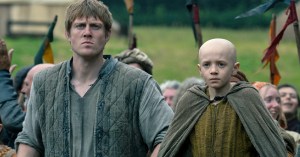Reese Witherspoon’s 10 Best Movies
We look at the ten best-reviewed films of the Hot Pursuit star.
She’s one of the highest-paid stars in Hollywood, with dozens of films to her credit and a lifetime box office gross total topping a billion dollars — and this weekend, Reese Witherspoon will add to that impressive sum with Hot Pursuit, an action comedy pairing her with Sofia Vergara. To celebrate Reese’s return to the big screen, as well as a terrific 2014 that included her Oscar-nominated work in Wild as well as a small supporting appearance in Inherent Vice, we decided to dedicate this week’s Total Recall to an appreciative look back at some of her best-reviewed releases.
10. LEGALLY BLONDE (2001) 68%

Critics tend to vilify the romantic comedy, but it’s an undeniable rite of passage for twentysomething actresses in Hollywood, and with 2001’s Legally Blonde, Witherspoon managed to enjoy the perks of the genre (such as the pay raise that comes with toplining a $141 million smash hit) without succumbing to its worst pitfalls (including dreadful scripts and scathing reviews). While Legally Blonde is far from groundbreaking, and its plot hinges on any number of silly contrivances, it’s never less than likable — largely thanks to a magnetic performance from its talented leading lady. In the words of Entertainment Weekly’s Lisa Schwarzbaum, “As an actor of distinction who’s all of 25, Reese Witherspoon reveals interesting dark roots even as she plays golden girls.”
9. MONSTERS VS. ALIENS (2009) 72%

In real life, Reese Witherspoon is a hair under five feet, two inches tall, which might be why the idea of playing a freakishly tall woman nicknamed “Ginormica” appealed to her — or maybe it was just the chance to score one of those cushy voice acting gigs that all the major celebrities seem to get these days. Either way, the result was Monsters vs. Aliens, Witherspoon’s only film of 2009 and a $381 million 3D hit for DreamWorks Animation. Alongside the famous voices of Seth Rogen, Kiefer Sutherland, Steven Colbert, Rainn Wilson, Will Arnett, and others, Witherspoon helped wreak family-friendly cartoon havoc — and helped earn praise from critics like the Houston Chronicle’s Amy Biancolli, who wrote, “True, the story doesn’t amount to much, but the plot tends to take a back seat when you’ve got a not-quite-50-foot version of Reese Witherspoon duking it out with a mighty alien robot alongside the Golden Gate Bridge.”
8. FREEWAY (1996) 76%

She’d made a few movies by the mid-’90s, but it was Reese Witherspoon’s work in 1996’s Freeway that really made critics sit up and take notice. At the center of this modern take on Red Riding Hood, playing a juvenile delinquent whose trip to her grandmother’s house is impeded by a wolfish sexual predator (Kiefer Sutherland), she essentially used her smoldering performance as a challenge, daring viewers to look away. It was a challenge unmet by many critics, including the Cincinnati Enquirer’s Margaret A. McGurk, who wrote, “I didn’t particularly want to like Freeway, but I couldn’t help myself. Reese Witherspoon made me.”
7. WALK THE LINE (2005) 82%

Witherspoon joined the ranks of Oscar-winning leading ladies for her sensitive portrayal of June Carter Cash in this Johnny Cash biopic, which follows the early years of the Man in Black (played by Joaquin Phoenix), including the beginning of his career and the romance that would endure through more than four decades of his life. One of the year’s biggest hits and a five-time Academy Award nominee, Walk the Line wasn’t without its concessions to Hollywood formula — or without its critics, including Cash’s daughter Rosanne — but most scribes had plenty of praise for the film, including Andrew Sarris of the New York Observer, who wrote, “I advise you catch up with Walk the Line, if only for Ms. Witherspoon’s transcendent joyousness as a still-growing legend within a legend.”
6. PLEASANTVILLE (1998) 85%

Gary Ross’ Pleasantville could easily have been nothing more than a gentle, simple satire about the way nostalgia changes our memories, but beneath the surface of the story — which sends a pair of squabbling modern teens (played by Witherspoon and Tobey Maguire) into the world of a 1950s sitcom — there’s some thoughtful commentary on civil rights and the cruelly arbitrary ways society can oppress those who don’t fit in. Pleasantville wasn’t a blockbuster hit, but it earned some of the best reviews of the year from critics like Louis B. Hobson of Jam! Movies, who wrote, “This wondrous little fable is a cross between The Truman Show and Back to the Future — and it’s better than both.”
5. THE GOOD LIE (2014) 88%

Befitting its title, The Good Lie practiced a bit of well-meaning subterfuge with its marketing materials, selling this fact-based drama about the American lives of Sudanese refugees once known as “lost boys” by putting Witherspoon’s face front and center on the poster. But if her character — a Kansas City settlement worker given the life-altering task of helping her charges adjust to their new environment — isn’t truly central to the story, her performance remains a solid anchor in a film whose ingredients run the gamut from Hollywood gloss to real-life horror. “This is very much a mainstream movie meant to shine a light on the plight of people who were ignored for too long,” wrote the Arizona Republic’s Bill Goodykoontz. “For that reason alone, it’s well worth seeing.”
4. THE MAN IN THE MOON (1991) 89%

For her first film, Witherspoon found herself in good company, including director Robert Mulligan (concluding a career that included To Kill a Mockingbird and Summer of ’42) and co-stars Sam Waterston and Tess Harper. But in this sweet coming-of-age drama, it’s Witherspoon’s character that largely drives the story, and she carried the film with an assured performance that belied her youth and lack of experience. Man in the Moon “gets an outstandingly natural performance out of Miss Witherspoon, who has no trouble carrying a lot of the film single-handedly,” wrote Janet Maslin for the New York Times. “It falls to her to remind the audience that this story is at heart about a family, and she does.”
3. WILD (2014) 90%

The sort of physically and dramatically demanding role that an actor can spend an entire career waiting to score, Wild gave Witherspoon the opportunity to shoulder an entire film pretty much on her own — and she more than delivered, bringing Cheryl Strayed’s unflinching memoir to the screen with a suitably fierce drama (directed by Jean-Marc Vallée from a screenplay by Nick Hornby) that takes viewers on a harrowing hike along the Pacific Crest Trail while reliving key moments from its protagonist’s bumpy past. At the forefront of it all are solid performances from Witherspoon and Laura Dern, both of whom picked up Oscar nominations for their efforts. As Mick LaSalle wrote for the San Francisco Chronicle, “This pensive, reflective, complicated Witherspoon feels more real than the one she left behind — and more in keeping with how she started, in hard-hitting independent movies 20 years ago.”
2. ELECTION (1999) 92%

It takes a special type of young actress to embody a character who is both seductive enough to destroy one high school teacher’s career and irritating enough to turn another teacher into an election-fixing madman — and that’s exactly what Witherspoon did as Election‘s Tracy Flick, the overachieving senior whose steamrolling campaign for student body president inspires one of her teachers (Matthew Broderick) to take desperate measures to keep her out of office. Critics expected great things from writer/director Alexander Payne after 1996’s Citizen Ruth, and Election delivered — and it also helped cement Witherspoon’s burgeoning reputation, thanks to reviews from critics like CNN’s Paul Clinton, who wrote, “Reese Witherspoon is proving to be one of the most versatile actresses of her generation.”
1. MUD (2013) 98%

Just when it seemed like she might be forever doomed to a lifetime of romantic comedies like Four Christmases and This Means War, Witherspoon turned up next to her fellow rom-com refugee Matthew McConaughey in 2013’s Mud — and although he received much of the movie’s accolades for one of the roles that helped spark his so-called “McConaissance,” there really are no false notes or out-of-place performances in writer-director Jeff Nichols’ tale of a mysterious man who claims to be on the run from bounty hunters and desperate to flee with the love of his life. Calling it “More than a mere tribute to Twain and Dickens,” the Vine’s Alice Tynan wrote, “This has all the makings of a modern classic.”






